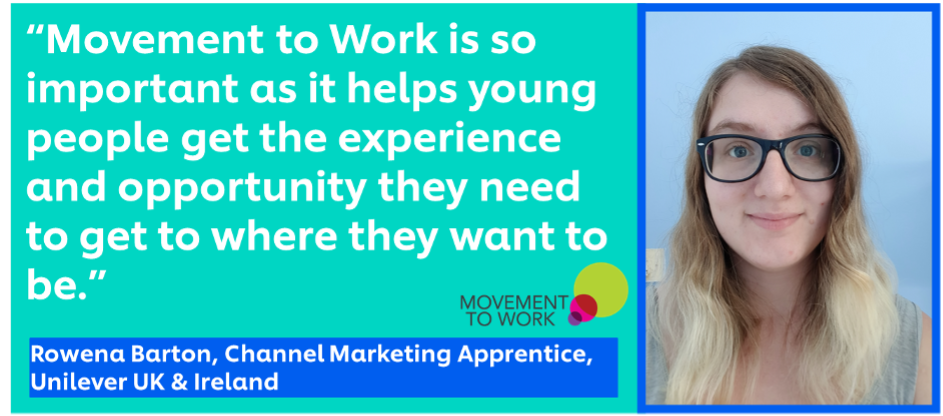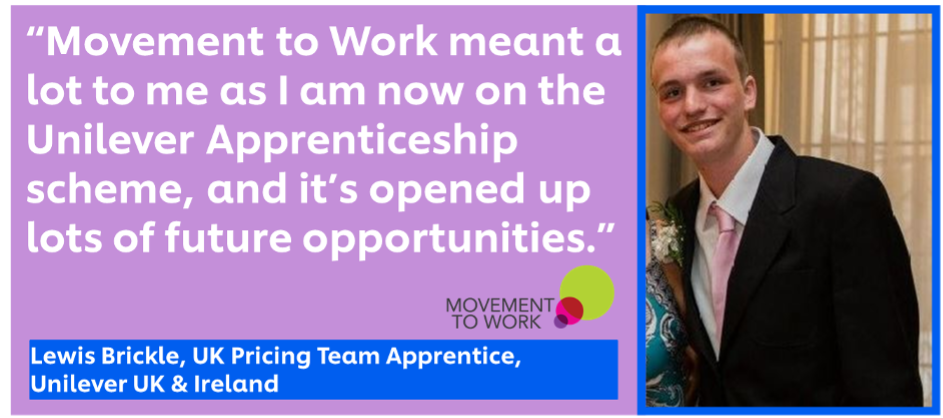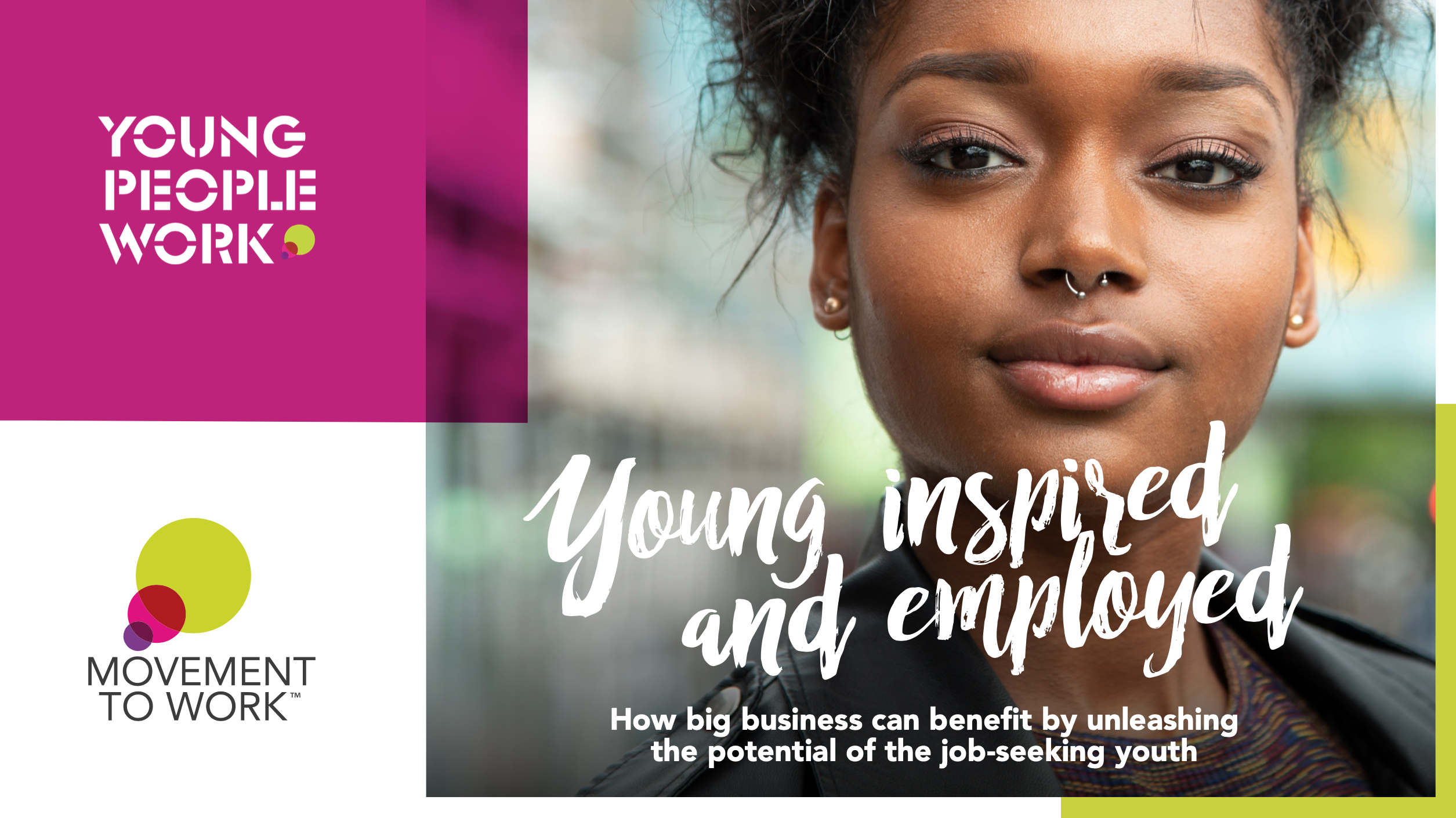Investing in young people and playing our role in ensuring equal opportunities for employment is key to building a sustainable business. This was recently highlighted as part of Unilever’s new global social commitments, which include an ambition to equip 10 million young people with essential skills to prepare them for job opportunities by 2030.
In the UK, we’re committed to building our employment programmes and giving opportunities to young people, so they can find their confidence and place in employment. In 2019 we launched our Unilever Futures strategy to champion long-term investment in future talent. Through our Unilever Futures programmes, we aim to inspire people from all backgrounds to find their purpose and rise to their full potential.
Movement to Work, a coalition of the UK’s leading employers, civil society and Government, is a key part of our Unilever Futures model, supporting 16 to 30-year olds, not in education, employment or training into sustainable employment, through a 4-week work experience programme. Unilever UK is proud to be a founding member and one of 250 employers working with Movement to Work to provide real work experience, exposure to world-class brands and insights into different careers.
Since 2016, Unilever UK has hosted over 100 Movement to Work placements for young people, of which 32 individuals have gone on to gain further employment within our organisation.
Read below the inspiring stories of some of our Unilever Movement to Work alumni…

Rowena Barton
I’m from Southampton but moved up to Epsom a few years ago to stay with my boyfriend and his family. I signed up to the Job Centre, found out about the Movement to Work scheme and went for it. I genuinely view it as such a valuable experience, especially if you’re not in employment or you’re looking to get an idea of what kind of job you’re after. When I was on the MTW scheme, I worked in Supply Chain doing small tasks and assisting on projects, including testing a website to make sure it was functioning.
Due to my success on the Movement to Work programme, and on the recommendation of my placement line manager, I was fast-tracked to a discovery centre for the Unilever apprenticeship programme and got offered a role starting September 2020. In my current apprenticeship role, I look after an internal training platform by creating monthly courses to train our wider team. I also support my team with creating artworks for both customers and consumers in varying channels and trade.
The Movement to Work programme has meant a lot to me as it’s allowed me to create new friendships around my home area, gain a better and more positive professional outlook on myself and my skill set and has given me a chance to change my career path to align with my own passions and interests.
I think that the Movement to Work programme is so important because it really helps young people get the experience that some other jobs may not and may also provide an alternative career path for someone who’s just finished university or even looking for a change of pace. The programme really gives people the opportunity they need to get to where they want to be and for some gives that needed boost to take that first step.
I would really encourage people to think about becoming a Movement to Work line manager or mentor because having that support can be invaluable to someone who’s looking for that bit of extra help to go from A to C, you might just be the point B to help them get to where they want to be. It’s a fantastic opportunity to give yourself some skills to test as well.

Lewis Brickle
Whilst out of work, I got involved with the Movement to Work programme via my local Job Centre. I took part in a month’s long work experience placement, where I worked with the Surf Marketing team based in Leatherhead.
After my placement finished, I was invited to a discovery centre for the Unilever apprenticeship programme and got offered a role starting in September 2020. Since joining as an apprentice I’ve worked with both the Pricing Team and the TTS Team, which has allowed me to learn a lot about how pricing works and how companies deal with invoices, as well as gaining lots of new Excel skills.
The Movement to Work programme has meant a lot to me as I am now on the Unilever apprenticeship scheme, and it’s opened up lots of future opportunities.
I would encourage anyone to be a Movement to Work mentor or line manager because young people need that help getting a foot in the door, and a chance to show what they can do. This programme is the perfect way to offer that chance to them!

Aarushi Vishnoi
I graduated with a first-class degree in Pharmacology from the University of Bristol in 2018 but struggled to secure a job after graduating, receiving what seemed like endless rejections or no responses from companies. I decided to go to my local Job Centre to receive support in finding a job and found out about the Movement to Work from my work coach. I completed the Movement to Work programme with Unilever in April 2019.
After completing my placement, I secured a Commercial Executive role within Unilever, which involved promotional and financial planning for two large retailer accounts. This role gave me an excellent grounding in how businesses work and helped me to develop a variety of skills. I made a positive impact in this role, including clearing a backlog of admin, creating better ways of working and spotting and fixing an error that will save the company millions going forward. After a year and a half, I was promoted to R&D Assistant Manager where I manage innovation projects and ensure new homecare products launch successfully in the UK. I am enjoying the challenge of extra responsibility and learning new things!
I am really grateful to the MTW programme as it helped me gain back the confidence I had lost from job application rejections and enabled me to obtain the vital experience I was missing to start my career.
I would encourage you to be a Movement to Work mentor or line manager because it is more important than ever before that young people are given work experience opportunities to kick-start their careers. I also know from my own mentoring experience that it is very rewarding to help a mentee realise their potential.
Want to become an employer member of Movement to Work?
Get in touch today and find out how we can help you unlock diverse youth talent and offer you dedicated support free of charge: info@movementtowork.com














